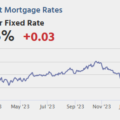Bitcoin recently touched the $65,000 mark, its highest in almost three weeks, driven by a surge in demand for U.S. exchange-traded funds (ETFs) and growing speculation that the Federal Reserve might soon ease its monetary policy. The world’s largest cryptocurrency briefly touched $65,050 during Sunday’s trading session before pulling back to just below $64,000 on Monday. Bitcoin has risen over 10% since the past week, the largest increase since mid-July.
The crypto market took notice after Fed Chair Jerome Powell hinted at the possibility of lowering benchmark interest rates from their current two-decade highs. This signaled a potentially more favorable liquidity environment for global markets, sparking optimism among investors. Following Powell’s comments, Bitcoin prices soared, and ETFs saw a net inflow of $252 million, the largest in over a month.
Bitcoin’s market cap currently stands at $1.242 trillion, with the cryptocurrency maintaining a 56.3% dominance in the market. While the short-term outlook may seem uncertain, the long-term trend for Bitcoin and the broader crypto market remains positive.
With Bitcoin prices still hovering around $60,000, the broader crypto market remains hot, keeping investor interest high. Buying Bitcoin directly is one option for those looking to ride the crypto wave. But if you’re seeking more conventional routes to gain exposure, tech giants like Block, Inc. (SQ) and PayPal Holdings, Inc. (PYPL) offer intriguing opportunities to tap into the cryptocurrency boom without diving headfirst into the volatility of digital currencies.
PayPal’s Digital Wallet Gets a Crypto Upgrade
PayPal is widely recognized as a leader in digital payments, with over 400 million users globally. Whether you’ve used it to shop online or send money to a friend, PayPal has become a trusted name in secure digital transactions. Beyond its core offerings, the company owns Xoom, an international money transfer business, and Venmo, a peer-to-peer money app.
In 2020, PayPal entered the crypto space, allowing users to buy, sell, and hold crypto assets. Initially, customers couldn’t move their holdings off the platform, but that changed as the company evolved its crypto services. Today, users can seamlessly buy, transfer, and sell cryptocurrencies like Bitcoin, Ethereum, Litecoin, and Bitcoin Cash within and outside of PayPal’s ecosystem. This move has firmly positioned PYPL as a crypto adopter among fintech giants.
While PayPal’s earnings reports don’t always spotlight its crypto activities, the numbers tell an impressive story. In the second quarter, PYPL reported revenue of $7.89 billion, surpassing expectations and reflecting a 9% increase year-over-year. The company’s peer-to-peer payments grew for the first time in three years, with Venmo leading the charge with an 8% increase.
Although PayPal doesn’t disclose specific crypto holdings, its total payment volume grew 11% to $416.8 billion, with non-GAAP net income rising 28% from the prior-year quarter to $1.24 billion. Also, the company’s non-GAAP EPS stood at$1.19, up 36% year-over-year.
Moreover, PayPal’s stablecoin, PYUSD, has gained significant traction, reaching a market capitalization of over $1 billion just a year after its launch. This impressive growth explains why the company isn’t shouting about its crypto ventures from the rooftops; its success in the space speaks for itself.
For investors, there’s more good news. PYPL has increased its planned share buybacks from $5 billion to at least $6 billion this year, a move likely to boost the value of remaining shares. With its massive scale and strong user base, PayPal is well-positioned to bridge the gap between traditional finance and the rapidly evolving crypto ecosystem.
As the company continues to integrate crypto into its offerings, there’s potential for shares to soar even higher. If you’re bullish on the intersection of fintech and crypto, PayPal is definitely a stock to watch.
Block, Inc. (SQ) Shows High Crypto Ambitions
Block, formerly known as Square, has established itself in the fintech space, and its crypto ambitions are front and center. The company, which operates through its Square platform and the peer-to-peer app Cash App, has fully embraced the blockchain revolution.
Cash App is SQ’s direct competitor to Venmo, allowing its 50 million users to engage in various crypto transactions. But Block isn’t stopping there. It’s leveraging its Square platform to accept cryptocurrency payments, offering merchants a seamless way to integrate digital assets into their transactions.
On top of that, the company is driving innovation through its TBD and Spiral divisions, which are focused on creating open-source tools to accelerate blockchain adoption. Even its music streaming service, Tidal, is exploring blockchain for copyright management, potentially transforming how the industry handles royalties.
Despite a 16% decline in stock price year-to-date, driven by concerns over revenue growth and macroeconomic pressures, the company remains focused on long-term crypto initiatives. SQ’s second quarter results were a mix of ups and downs, with revenue of $6.16 billion falling short of the Street’s estimate of $6.30 billion but an adjusted EPS surge of over 132% year-over-year to $0.93, far exceeding analysts’ forecasts.
The company reported a net income of $189.87 million compared to a loss of $105.38 million in the previous year. Block has also been actively returning capital to shareholders, announcing a $3 billion share buyback program and repurchasing over $390 million in the second quarter alone.
While Block’s top line has been inconsistent, its strong financial footing and deep involvement in Bitcoin initiatives make it a compelling option for long-term investors. If you believe in the growth of crypto, Block offers a unique and multifaceted exposure that few other stocks can match.



